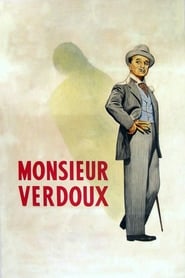The Great Dictator envisioned a world where all people could unite for peace; Monsieur Verdoux presents one where everyone is culpable in the coming war.[…]
Many of the sets look artificial, though in a way that heightens the performances instead of undercutting them. When the con man Verdoux stares out at a perfectly circular moon, on what is obviously a painted backdrop, the resulting image—a charlatan against a false sky—packs a poetic punch that would have been impossible had Chaplin chosen to use a real window looking out onto a real cityscape. [U]nlike the Tramp, Verdoux talks—and he talks a lot. Chaplin’s voice was a beautiful instrument, delicate but rich, with diction so crisp that you could hear the punctuation marks. He never used it to better effect; Verdoux’s pretentious flattery, misunderstood asides, and ad-libbed deceptions play like comic music.
— Ignatiy Vishnevetsky (Criterion)
The film, which Chaplin subtitled A Comedy of Murders, would be his first flop, but it would also come to be considered a landmark of a form not yet fully realized in cinema: black comedy—that is, comedy that makes light of the darkest material of life, frequently referring to death itself. In literature, black comedy can be found as far back as the Greeks, but in film, its evolution would be slow and tentative.
— Stephen Winer (Criterion)
“Numbers sanctify” isn’t a declaration of relative innocence, but a condemnation of everything else; the important takeaway is that if we can be charmed by one corrupt man, we can surely be charmed by many. And for what we let slide we should feel contempt.
— Calum Marsh (Slant Magazine)
The brilliance of the repeated sight gag of Verdoux rapidly counting the money of his deceased wives is due to its being both an act of efficient, trained rationality and an expression of a certain giddy enthusiasm—this is Verdoux’s version of post-coital bliss. [O]ne is continually reminded that Verdoux himself relies on the chaos in the world, the disconnection between people. There is Chaplin’s repeated use of a shot of frantically whirling train wheels, symbolic of the systems of modernity that Verdoux must manipulate to carry out his schemes—a parallel to the idyllic scene in the rose garden interrupted by the shot of the chimney pouring out evidence of his terrible industry.
— Joseph Vasquez (Slant Magazine)
Synopsis: The film is about an unemployed banker, Henri Verdoux, and his sociopathic methods of attaining income. While being both loyal and competent in his work, Verdoux has been laid-off. To make money for his wife and child, he marries wealthy widows and then murders them. His crime spree eventually works against him when two particular widows break his normal routine.

